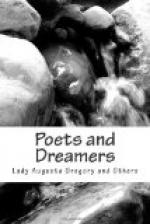IV.
A man near Oranmore says: ’There used to be great talk of the Fianna; and everyone had the poems about them till Raftery came, and he put them out. For when the people got Raftery’s songs in their heads, they could think of nothing else: his songs put out everything else. I remember when I was a boy of ten, I was so taken up with his rhymes and songs, I had them all off. And I heard he was coming one night to a stage he had below there where he used to come now and again. And I begged my father to bring me with him that night, and he did; but whatever happened, Raftery didn’t come that time, and the next year he died.’
But it is hard to judge of the quality of Raftery’s poems. Some of them have probably been lost altogether. There are already different versions of those written out in manuscript books, and of these books many have disappeared or been destroyed, and some have been taken to America by emigrants. It is said that when he was on his deathbed, he was very sorry that his songs had not all been taken down; and that he dictated one he composed there to a young man who wrote it down in Irish, but could not read his own writing when he had done, and that vexed Raftery; and then a man came in, and he asked him to take down all his songs, and he could have them for himself; but he said, ’If I did, I’d always be called Raftery,’ and he went out again.
I hear the people say now and then: ’If he had had education, he would have been the greatest poet in the world.’ I cannot but be sorry that his education went so far as it did, for ’he used to carry a book about with him—a Pantheon—about the heathen gods and goddesses; and whoever he’d get that was able to read, he’d get him to read it to him, and then he’d keep them in his mind, and use them as he wanted them.’ If he had been born a few decades later, he would have been caught, like other poets of the time, in the formulas of English verse. As it was, both his love poems and his religious poems were caught in the formulas imported from Greece and from Rome; and any formula must make a veil between the prophet who has been on the mountain top, and the people who are waiting at its foot for his message. The dreams of beauty that formed themselves in the mind of the blind poet become flat and vapid when he embodies them in the well-worn names of Helen and Venus. The truths of God that he strove in his last years, as he says, ’to have written in the book of the people,’ left those unkindled whose ears were already wearied with the well-known words ‘the keys of Heaven,’ ‘penance, fasts, and alms,’ to whom it was an old tale to hear of hell as a furnace, and the grave as a dish for worms. When he gets away from the formulas, he has often a fine line on death or on judgment; the cheeks of the dead are ’cold as the snow that is at the back of the sun;’ the careless—those who ’go out looking at their sheep on Sunday instead of going to Mass’—are warned that ‘on the side of the hill of the tears there will be Ochone!’




